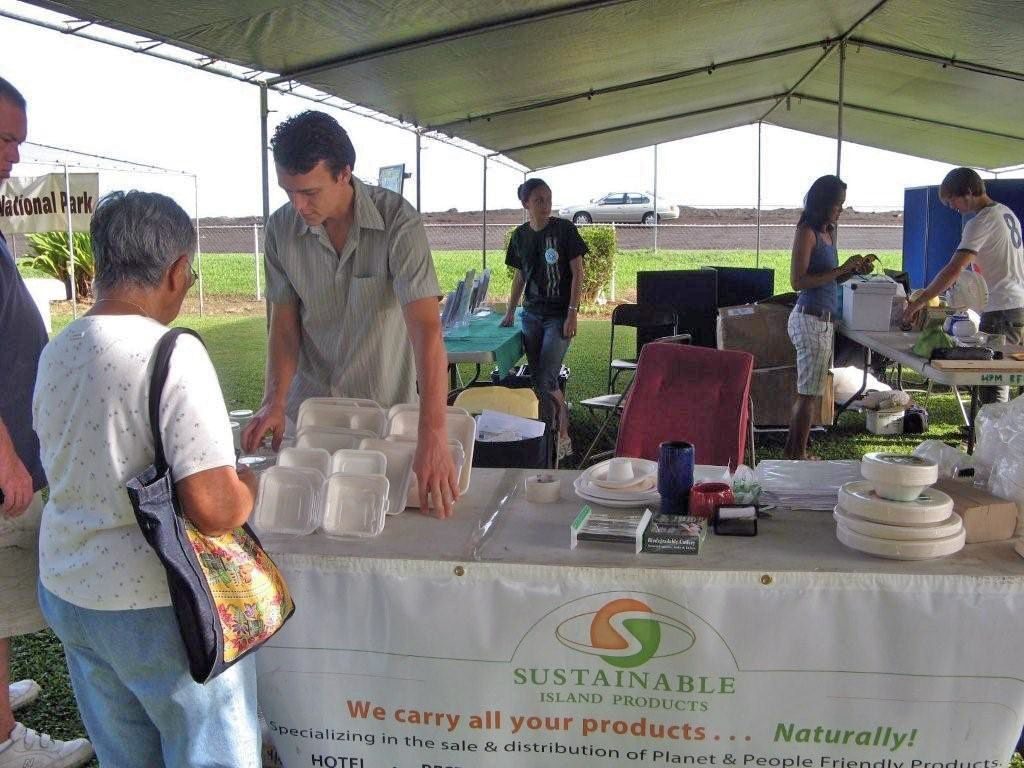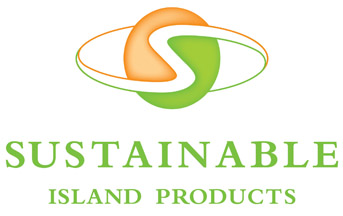MEMO
Date: December 17, 2008
To: Richard Ha
From: Leslie Lang
Subject: Sustainable Island Products/Jesse Law
Richard,
I just had a great talk with Jesse Law, founder of Sustainable Island Products in Hilo – the company that had a display recently at the E Malama ‘Aina sustainability festival. He sells and distributes about 100 plant-based “to go” and other products, like compostable hot cups, sugar cane paperware, plant starch utensils and more. Here’s Jesse showing some of his products.
What an interesting guy. You and Jesse seem to be two peas in a pod in terms of how you think about the community and the environment, and also, perhaps, your philosophies about business. The point of this memo is to convince you to call Jesse and meet him for coffee one day. I think you two would have a lot to talk about.
He told me he started his business a couple years ago when all the cover stories in the newspapers were about the landfill and waste management issues in Hawai‘i. He started looking at what goes into the landfills, and he told me he learned that Hawai‘i is the single highest user per capita in the country of single-use disposables such as plates for plate lunches, throwaway food packaging and “to go” food packaging.
Here in Hawai‘i, he said, we produce twice the national average of trash every day! The average American produces 4.5 lbs of trash per day, but in Hawai‘i we create 9 lbs. of trash per day per person.
I had no idea. When I asked him why, he said part of it is that we ship everything in, so have all that packaging to dispose of; and also that we don’t have effective composting of food scraps. He said something like 30-34 percent of the waste going into our landfill is compostable food scraps. But that’s another story.
He wanted to start a socially responsible business in Hawai‘i, started looking at what was going into the landfill and saw people were still using plastic and Styrofoam for their food. “In addition to the landfill, those also have ocean and cancer issues,” he said. “I saw the opportunity to address all that.”
He started distributing plant- based food- and drink-related “to go” supplies and other environmentally friendly products. He explained that the products he distributes are certified compostable. He calls them “Plant and People Friendly” products.
I asked him to tell me about one of his products specifically and he talked about his paper coffee cups. “Other people have a paper cup you can drink coffee out of, too. The difference is that they have a petroleum liner in their cup, and I have a biodegradable corn-based liner. Why is that important? Any petroleum-based products have petroleum distillates that leach into cold or hot foods. They leach benzene and styrene, which are listed carcinogens. And using oil, which is toxic to people and the environment, inhibits the biodegradation of the product.
“My product is certified compostable by the Biodegradable Products Institute. My manufacturer is in the process of certifying that paper source. The liner is non-toxic, plant-based, and made from Natureworks PLA, a carbon-neutral, corn-based polymer.”
Another product he told me about is his sugar cane plate. “The other distributors sell a paper plate,” he said. “Paper products require a minimum of 40 percent virgin pulp, on average, to make them. There’s bleaching and de-inking, which is very toxic to the environment. The quantity of energy and water used is very big. And the paper plate leaches dioxins into your food.”
“My sugar cane product uses a non-toxic bleaching process. And it’s a secondary material. We have the product being grown here and being manufactured as a food product. The waste could be manufactured into a second product, used completely by the community here and composted back into the soil. Instead of creating landfill, toxicity and litter into the ocean, air and land, we could have a local industry complimenting the manufacture of a second product used in Hawai‘i. It’s a zero waste equation.”
Imagine – a plate that can be eaten by worms, return to the soil and is not toxic.
He told me he finds that people are really impressed with potato starch utensils. “It’s just amazing that you can make a plastic utensil out of potato starch,” he said.
The products are becoming more affordable, he said. These sustainable products do still cost more than competitive products, he said, and “generally that will be the trend until there is enough manufacturing to meet the demand. It is becoming more affordable as the cost of oil continues to go up.”
Every quarter, his Sustainable Island Products runs a newspaper ad listing and promoting all its new customers, who, he said, are taking a stand for their community and their environment.
People should understand that where they spend their money really has an impact, he said. “People vote with their dollar,” he said. “My interest is in having the public support those business that are using these types of products. That doesn’t necessary mean they’re buying from me. They could be buying them from other distributors.”
Jesse told me he doesn’t think his sustainable products are the ultimate answer to our problems. “But I’m doing what I’m doing to educate the market that there was ways to do what we do that have less impact, and that are safer, and are logical – and to try to move the market. I can’t participate in business I don’t believe has some social equity equation in it.”
Richard, he told me he’s heard you speak a few times and knows you are a leader here in sustainability issues. He also said to tell you he has a sustainable type of packaging that might be perfect for your lettuces. Go check it out!
MEMO
Date: December 17, 2008
To: Leslie Lang
From: Richard Ha
Subject: Sustainable Island Products/Jesse Law
Leslie:
That is so interesting. I’m going to give Jesse a call. It goes to show that you can do the right thing and still have a viable business. Thanks for telling me.
Richard



Dear Leslie,
Excellent initiative (both yours and jesse’s)!’
I interviewed Jesse for the last edition of the Lonely Planet Big Island guide (see pp 44) and hope to do a longer article on SIP soon.
Keep up the great work!
Conner